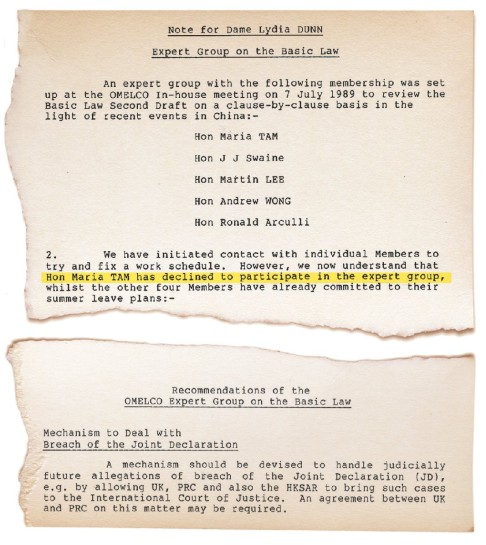Legco documents show then members proposed changes to mini-constitution - but to no avail
JOYCE NGjoyce.ng@scmp.com
PUBLISHED : Monday, 27 July, 2015, 4:56am
UPDATED : Monday, 27 July, 2015, 3:04pm
A Chinese man stands in front of a line of tanks heading east on Beijing's Cangan Blvd., in Tiananmen Square in this June 5, 1989, file photo. Photo: AP
Hong Kong's government pulled together a task force to review the possible repercussions of China's Tiananmen Square crackdown on the city's mini-constitution in July 1989, newly-released documents reveal.
The declassified documents, under the heading "Expert Group on the Basic Law", were released by the Legco archive office following a request by the South China Morning Post. The bundle contained 19 documents including a report setting out recommendations on the city's Basic Law, which was in the process of being drafted.
They revealed that the expert group was set up at the Office of the Members of the Executive and Legislative Councils (Omelco) in July 1989 to review the second draft of the Basic Law clause by clause "in the light of recent events in China". It comprised four members including Martin Lee Chu-ming, Andrew Wong Wang-fat, Ronald Arculli and the late John Swaine. Wong and Swaine would later become Legco presidents. Beijing loyalist Maria Tam Wai-chu, also a Basic Law drafter, declined to participate.
 Some of the documents released from the Legco archive.The declassified records also detail ideas put forward by the experts, such as suggesting that Beijing station its troops in Shenzhen rather than in the city, and that the Hong Kong government would have the "final say" over the entry of mainlanders. However, these suggestions were not adopted in the final version of the Basic Law, which was promulgated in Beijing on April 4, 1990.
Some of the documents released from the Legco archive.The declassified records also detail ideas put forward by the experts, such as suggesting that Beijing station its troops in Shenzhen rather than in the city, and that the Hong Kong government would have the "final say" over the entry of mainlanders. However, these suggestions were not adopted in the final version of the Basic Law, which was promulgated in Beijing on April 4, 1990.
"As it shows, demands to change the Basic Law have always been there - now people are scolding students for burning Basic Law copies and asking for amendments - and I was the first to suggest doing so," said Martin Lee Chu-ming, a member of the expert group and a Basic Law drafter who resigned in the wake of the Tiananmen crackdown.
The 1984 Sino-British Joint Declaration set out arrangements for the transfer of sovereignty and stated that the central government's basic policies towards Hong Kong would remain unchanged for 50 years after 1997. But the treaty was silent on how disputes over implementation should be resolved.
The first recommendation it made was for a mechanism "to handle judicially future allegations of breach of the Joint Declaration". It suggested that Britain, China and Hong Kong could bring such cases to the International Court of Justice.
Wong recalled last week that the group considered it important to bring in the International Court of Justice to draw international attention to any problems. “China may not like to accept the court’s jurisdiction, but putting the demand before it was more like a gesture – to reject the court would look unreasonable,” he said.
Wong recalled earlier this month that the group considered it important to bring in the international court to draw attention to any problems. "China may not like to accept the court's jurisdiction, but putting the demand before it was more like a gesture - to reject the court would look unreasonable," he said.
The report was delivered to the then British minister of state in charge of Hong Kong affairs, and would be sent to the then chief secretary, Swaine wrote in a letter to a Hong Kong government official included in the record. And despite a motion passed by the Legislative Council calling for the mini-constitution to be amended according to recommendations made by Omelco, no recommendations were adopted in what was to become Basic Law.
"I don't know what became of the expert report afterwards," Wong recalled. "Beijing never recognised Omelco as a negotiating target. Only the British government was qualified to talk to them."
International involvement in Hong Kong affairs, especially on political reform, has become a sensitive issue for Beijing. Last year, British parliamentarians cancelled a trip to the city to investigate the Joint Declaration's implementation after a mainland official said its members would not be allowed to come.
http://m.scmp.com/news/hong-kong/politics/article/1843919/debate-over-amending-hong-kong-basic-law-goes-back-far-1989